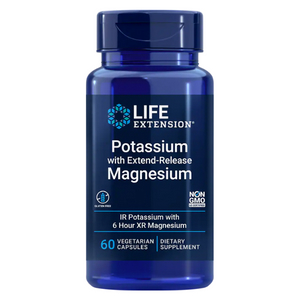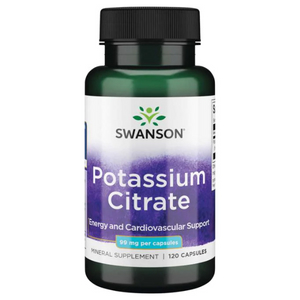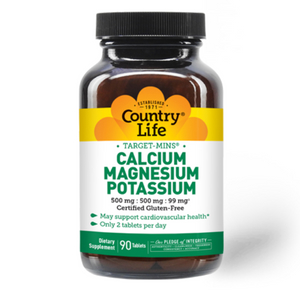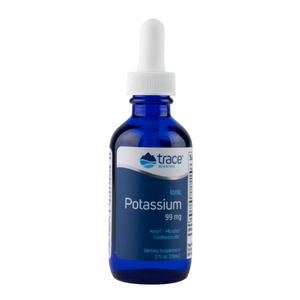 Expert's opinion
Expert's opinion
The article is a subjective view on this topic written by writers specializing in medical writing.
It may reflect on a personal journey surrounding struggles with an illness or medical condition, involve product comparisons, diet considerations, or other health-related opinions.
Although the view is entirely that of the writer, it is based on academic experiences and scientific research they have conducted; it is fact-checked by a team of degreed medical experts, and validated by sources attached to the article.
The numbers in parenthesis (1,2,3) will take you to clickable links to related scientific papers.
5 Best Potassium Supplements for Cramping 2024: Top Brand Reviews
All articles are produced independently. When you click our links for purchasing products, we earn an affiliate commission. Learn more about how we earn revenue by reading our advertise disclaimer.

Life Extension Potassium with Extend-Release Magnesium
- 100% money-back guarantee.
- Blood pressure support.
- Gluten-free.

Swanson Ultra Potassium Citrate
- Potassium chloride.
- Third-party tested.
- Budget-friendly.

Country Life Calcium Magnesium Potassium
- Multiple salt formula.
- Gluten-free.
- Kosher and Halal.
Do you suffer from leg cramps or muscle spasms? If so, a potassium deficiency[1] indicates you need to supplement your potassium.
Potassium[2] is an essential mineral critical for muscle and nerve function, fluid and electrolyte balance, and high blood pressure regulation.
Low potassium levels, in conjunction with other factors, cause cramps and muscle spasms, especially in the legs. You may consider a potassium supplement to help.
5 Best Potassium Supplements For Cramping On The Market In (May. 2024)
- Life Extension Potassium with Extend-Release Magnesium – Editor’s Choice
- Swanson Ultra Potassium Citrate – Best Budget-Friendly Potassium Supplement For Cramping
- Country Life Calcium Magnesium Potassium – Best Potassium Supplement For Athletes
- Nature Made 550 Mg Potassium Gluconate Tablets – Best Bioactive Potassium Supplement For Cramping
- Trace Minerals Liquid Ionic Potassium Supplement – Best Liquid Potassium Supplement For Cramping
Why Should You Take Potassium Supplements?
Potassium is a vital mineral for the proper function of the human body. It is in many important processes, including nerve function, blood vessels,[3] and pH. Potassium helps balance the body’s fluids and electrolytes, which is crucial for maintaining a healthy heartbeat, muscle function, and nerve communication.
Most people get potassium from food[4] sources such as bananas, dried fruits, avocados, spinach, and sweet potatoes. However, some individuals may have health conditions that increase their need for this mineral.
These conditions include kidney disease,[5] chronic diarrhea or vomiting, or certain medications such as diuretics. Diuretics are drugs that help the body get rid of salts, including potassium. In these cases, a potassium supplement may be necessary.
Low potassium levels can lead to dangerous hypokalemia, i.e., low potassium levels[6] causing cardiac arrhythmia.
Muscle Cramps
Muscle cramps are sudden, involuntary contractions of one or more muscles caused by fatigue, dehydration, nerve damage, and poor circulation. Usually not serious, they can be uncomfortable; they can be managed with proper hydration, stretching, rest, and potassium salt supplementation.
Athletes, who frequently push their muscles to the limit, may require more potassium s. Individuals on a low-carbohydrate diet need it due to the limited intake of fruits and vegetables. Potassium enters the cells[7] via insulin secretion after ingesting glucose; low glucose can cause less potassium absorption into the tissues. Supplementing with this mineral may help both groups with these symptoms.
Taking too much potassium is dangerous and potentially life-threatening, particularly for individuals with kidney disease or those taking certain medications. Therefore, consult with a healthcare professional before beginning any new supplement.
Types Of Potassium Supplements
Dietary potassium supplements are available in different forms, each with unique characteristics and benefits. Here are the most common supplements made of potassium salts:
Potassium Chloride
This is the most common form of potassium supplement, available in capsules and powders. Potassium chloride works fast, is absorbed easily, and is an effective way to increase potassium levels; it can also lower high blood pressure[8] when KCl is substituted for NaCl — common salt.
Potassium Citrate
This supplement is often used to prevent[9] kidney stones. Potassium citrate supplements are less likely to cause stomach upset and are absorbed more slowly than potassium chloride.
Potassium Gluconate
This potassium supplement[10] is commonly used to treat potassium deficiencies and may ease muscle cramps. It is gentle on the stomach and is easily absorbed by the body.
Potassium Bicarbonate
This supplement is often used to treat metabolic acidosis,[11] a condition in which the body is too acidic. Potassium bicarbonate can help regulate the body’s pH levels and is easy on the stomach.
Potassium Iodide
Potassium iodide pills[12] are used to treat documented iodine deficiency and protect the thyroid glands from iodine radiation damage.
Potassium Phosphate
This supplement is a combination of potassium and phosphorus. It is often used to treat low phosphate levels[13] in the body and can help increase potassium levels. Patients that cannot eat or drink get this potassium salt administered through intravenous fluids.
Potassium Aspartate
This potassium supplement combines potassium and aspartic acid. Potassium aspartate is typically used to treat and prevent irregular heartbeat and other cardiac disruptions or arrhythmias after cardiac surgery.[14]
One could wonder which of the seven potassium salt supplements above is the best for muscle cramps. And the response is that while they are all efficient, potassium gluconate has the highest absorption rate,[15] 94%.
5 Best Potassium Supplements In 2024
Life Extension Potassium with Extend-Release Magnesium
Life Extension Potassium with Extend-Release Magnesium supplement contains a combination of magnesium oxide and magnesium citrate optimized for immediate and prolonged uptake to ensure maximum health benefits.
- 100% money-back guarantee.
- A potassium and magnesium combo.
- Affordable.
- Certificate of Analysis for every batch.
- It is more of a magnesium supplement than a potassium one.
This supplement promotes heart health and encourages healthy blood flow, which subsequently helps ease muscle cramps. The brand attests that the potassium with extend-release magnesium has been found to help maintain blood pressure that’s already normal. It combines 99 milligrams of potassium and 250 milligrams of magnesium to help support already healthy blood pressure levels.
Together, magnesium and potassium work synergistically to help ease muscle cramps. Magnesium[16] supposedly helps muscles relax, but the evidence isn’t really conclusive. Potassium[17] supports muscle and nervous system function and electrolyte balance.
Life Extension Potassium with Extend-Release Magnesium is gluten-free, non-genetically modified, and vegetarian. It comes in a 60-capsule bottle for $11.25, which is very affordable for its benefits.
Life Extension is dedicated to providing efficacious formulas, and their magnesium/potassium supplement is no exception. They have been researching for over 40 years to bring premium formulations to their customers.
Swanson Ultra Potassium Citrate
Swanson Ultra Potassium Citrate is an essential electrolyte mineral that provides several benefits to the human body. It supports nerve function and healthy muscles and assists with energy production while promoting optimal kidney function.
- Essential electrolyte balancing supplement.
- Supports nerve function.
- Supports healthy muscles.
- Third-party lab tested.
- 99 milligrams seems too low.
Each capsule of this formula delivers 99 milligrams of pure potassium citrate at a great value of only $5.99. Internal wellness experts develop Swanson Ultra Potassium Citrate with the latest science, and third-party labs test each batch for quality and safety.
Potassium citrate helps with muscle cramping by replacing potassium lost through sweat during exercise, and it regulates muscle contractions and relaxations. Potassium citrate can help regulate the body’s pH balance, which can also contribute to muscle cramping if it becomes too acidic. By providing the body with a proper balance of electrolytes and supporting pH balance, potassium citrate can help prevent and ease muscle cramping.
The other ingredients are rice flour, gelatin, and magnesium stearate.
One of the biggest concerns is that the 99 milligrams of potassium in each capsule is around 2% of the daily value, which some customers may find too low. Therefore, consulting a healthcare provider or seeking different forms with higher doses is important.
Country Life Calcium Magnesium Potassium
Athletes have continuous electrolyte challenges due to sweating. Country Life Calcium Magnesium Potassium dietary supplement is a great choice for athletes looking to support calcium, phosphorus, and magnesium levels, but not potassium levels.
- Multiple certifications.
- Supports cardiovascular health.
- Free from artificial ingredients.
- Supports bone health.
- Multiple minerals.
- It may only work for some.
- 99 milligrams is too low.
Calcium is required for muscle contraction,[18] with a deficiency causing muscle cramps and spasms. Magnesium, on the other hand, is a muscle relaxant that helps to alleviate muscle tension and cramping. Magnesium also regulates muscle contractions and helps prevent overstimulation of the muscles and cramping.
Phosphorus aids the body’s energy metabolism and is necessary for synthesizing adenosine triphosphate, the primary energy source for muscle contractions. Phosphorus also works with calcium in the body for strong bones[19] and teeth. Lastly, while adequate potassium intake helps prevent dehydration, a common cause of muscle cramps, this product’s 99 milligrams represents only 2% of the Daily Value recommended.
The product is GMO-free, USDA organic certified, Kosher, vegetarian, Halal, and more. While the supplement retails at $16.99, customers can enjoy a 20% discount when purchasing from the website.
Nature Made 550 Milligrams Of Potassium Gluconate Tablets
Of all the potassium supplement forms in this list, this one seems to have the highest potassium content. But it contains potassium gluconate, in which the elemental potassium is only about 16% or 90 milligrams. Potassium gluconate is highly bioavailable.[20]
- Offers heart support.
- Supports muscle and nerve function.
- High potency.
- Affordable price.
- 90 milligrams of potassium is too low.
Nature Made 550 milligrams Potassium Gluconate Tablets is a supplement option for those looking for potassium at an affordable price of $5.79. It contains 550 milligrams of potassium gluconate, which may be misleading because it is 90 milligrams of elemental potassium, the same as in all the others.
Thus, out of the 550 milligrams of potassium, only 90 milligrams are available to the body. This quantity is lower than other supplements, which becomes a disadvantage rather than an advantage.
Nonetheless, the formula supports heart, muscle, and nerve function and promotes digestion as an added benefit thanks to potassium gluconate. Oral potassium gluconate dissolves into potassium ions in the body, supporting muscle function and hydration.
The added gluconate molecule may also increase the solubility and absorption of the potassium ions. This increased bioavailability may help alleviate cramping faster.
This gluten-free product is also free from artificial colors, preservatives, and flavors.
Trace Minerals Liquid Ionic Potassium Supplement
This is yet another best potassium magnesium supplement with two more minerals, sodium and chloride. The brand claims that these minerals work together to help with easing and prevent muscle cramping faster and more effectively.
- Non-GMO, vegan.
- Contains multiple minerals.
- It may alleviate muscle cramping.
- Third-party tested.
- Unpleasant taste, according to some reviews.
The Trace Minerals Liquid Ionic Potassium Supplement is a liquid supplement that retails for $16.49. It is Non-GMO and vegan and contains magnesium, chloride, and sodium.
Chloride is an electrolyte that helps regulate the body’s fluid balance and aids in transmitting nerve impulses.[21] Sodium is also an electrolyte that helps balance bodily fluids and supports nerve and muscle function. These minerals and potassium and magnesium can help support healthy muscle function and alleviate cramping.
The product is made from potassium chloride, and the extra ingredients include Sea Minerals, ConcenTrace®, purified water, and citric acid.
This supplement is third-party tested to ensure the highest quality products. It comes with a metered dropper for easy dosing, but this may be less accurate than taking a tablet or capsule. Trace Minerals suggests adding drops to drinks or food.
How To Choose The Best Potassium Supplement
Potassium is crucial in maintaining healthy body functions. So much so that many people turn to potassium supplements to ensure they get enough of this important nutrient. Still, with so many options available, knowing which is best for you can take time. Here are some things to consider when choosing the best potassium supplement.
The Form Of Potassium
Firstly, consider the form of potassium the supplement contains and its pros and cons. For instance, when comparing potassium chloride vs. potassium citrate, the first is best for treating hypokalemia, and the latter helps prevent kidney stone formation. But these are clinical considerations typically out of the hands of consumers.
Potassium chloride is also a good choice for managing high blood pressure. Potassium citrate is more alkaline, which can help balance the body’s pH levels.
Seek Specific Potassium Forms For Specific Functions
If you are looking for the best potassium supplement for leg cramps, consider the potassium that works best for this issue. Potassium citrate or gluconate are often recommended for this purpose. They may help with muscle relaxation and are more bioavailable.
When seeking the best potassium supplement for high blood pressure, potassium chloride wins because substituting it lessens the amount of sodium chloride consumed.
Select High-Quality Potassium Supplements
Choosing a high-quality supplement from a reputable brand is also essential. Look for third-party testing and certifications, such as the vegan certification, to ensure that the supplement contains what it claims and is free of harmful contaminants.
Take Note Of The Extra Ingredients
Check if the supplement contains other essential minerals, such as magnesium, sodium, or chloride, which can enhance the benefits of potassium.
Recommended Dosage
The adequate daily potassium intake for a healthy adult male is 3,400 milligrams, and for a healthy adult female is 2,600 mg. However, the dosage may need to be adjusted if you take certain medications, are pregnant, or if your doctor deems it necessary.
Potential Side Effects
Here are some potential side effects of which to be aware with dietary potassium supplements:
- Gastrointestinal issues: Some people may experience diarrhea, nausea, vomiting, and abdominal discomfort after taking potassium supplements.
- Muscle weakness:[22] Potassium supplements may cause muscle weakness, especially when taken in large doses or if a person has preexisting kidney disease or an imbalance in electrolytes. This is a clinical complication more likely from serious diseases instead of supplements.
- Cardiac arrhythmia: High doses of potassium supplements can cause changes in heart health,[23] including irregular rhythm, leading to irregular heartbeat or cardiac arrhythmia. This is a clinical complication more likely from serious diseases instead of supplements.
- Low blood pressure: Potassium supplements may cause a drop in blood pressure, leading to lightheadedness, dizziness, and even fainting.
- Skin irritation: Some potassium supplements may cause skin irritation or rashes.
- Hyperkalemia:[24] Taking too much potassium, especially in people with impaired kidney function, can result in hyperkalemia, characterized by high potassium in the blood. This can lead to life-threatening complications like heart failure or kidney damage. This is a clinical complication more likely from serious diseases instead of supplements.
Final Thought
Make sure you have a healthy diet that includes naturally occurring foods high in potassium before you start wondering what the finest potassium supplement is. Bananas, leafy green vegetables, and baked potatoes are all rich sources of potassium.
It seems, however, that those who cannot get enough potassium through diet alone may find it helpful to take potassium supplements. This is inaccurate. Too much or too little potassium is not common in the general population nor diet-related but occurs with a serious disease, such as kidney failure or diabetic ketoacidosis.
Yet, supplement companies are misleading when they state, as one does, that “Many Americans are deficient in potassium because they eat a poor diet void of raw foods or deplete the body’s reserves through physical activity. Therefore, it can be helpful to supplement the diet with potassium to maintain healthy levels in the body.” The truth is that if you deplete your potassium, you will die. And it would take over 30 of their pills to reach the daily recommended amount of potassium.
Potassium supplements do not work like magic to cure leg cramps or other medical conditions. Dietary supplements can provide extra nutritional support, but a balanced diet and an active lifestyle must come first. Leg cramps have become more mysterious as research has studied them, and blaming a deficiency in potassium is probably too simplistic. Cramps occur via multifactorial mechanisms,[25] including age, gender, family history, and the biochemistry of the muscle fibers themselves.
Before beginning any supplement program, consult a registered dietitian for precautionary reasons.
Please read the amount of elemental potassium on supplement labels rather than the total amount listed, as this can impact dosage and effectiveness.
Frequently Asked Questions
It depends on your individual needs and health condition; however, the first thing is to add potassium-rich foods to your diet.
The best form of potassium supplement may vary depending on the individual’s health condition and needs. Potassium chloride is good for treating high blood pressure, potassium citrate for kidney stone treatment, and potassium gluconate for muscle cramps.
The best potassium supplement may vary depending on the individual’s health and needs. Some popular options include Country Life Calcium Magnesium Potassium, Nature Made Potassium Gluconate, and Trace Minerals Liquid Ionic Potassium. However, food is the best supplement.
Signs of low potassium may include muscle weakness and cramps, constipation, fatigue, and irregular heartbeats. If you suspect you have low potassium, you should call 911.
Potassium supplements can interact with certain drugs, such as potassium-sparing diuretics, nonsteroidal anti-inflammatories, and angiotensin-converting enzyme inhibitors. It’s important to speak with a healthcare provider before taking potassium supplements if you are taking any medications.
Adults’ recommended daily potassium intake is 2,500-3,400 milligrams. Getting potassium through a balanced diet that includes potassium-rich foods like bananas, spinach, and baked potatoes is important. Potassium supplements should only be taken under the guidance of a healthcare provider.
+ 25 sources
Health Canal avoids using tertiary references. We have strict sourcing guidelines and rely on peer-reviewed studies, academic researches from medical associations and institutions. To ensure the accuracy of articles in Health Canal, you can read more about the editorial process here
- Journal of Agricultural and Food Chemistry. (2020). Rise in Potassium Deficiency in the US Population Linked to Agriculture Practices and Dietary Potassium Deficits. [online] Available at: https://pubs.acs.org/doi/10.1021/acs.jafc.0c05139
- Nih.gov. (2019). Office of Dietary Supplements – Potassium. [online] Available at: https://ods.od.nih.gov/factsheets/Potassium-HealthProfessional/
- Harvard Health. (2005). Potassium lowers blood pressure – Harvard Health. [online] Available at: https://www.health.harvard.edu/heart-health/potassium-lowers-blood-pressure#:~:text=Potassium%20relaxes%20the%20walls%20of,and%20higher%20risk%20of%20stroke.
- The Nutrition Source. (2019). Potassium. [online] Available at: https://www.hsph.harvard.edu/nutritionsource/potassium/
- Yamada, S. and Inaba, M. (2021). Potassium Metabolism and Management in Patients with CKD. Nutrients, [online] 13(6), p.1751. doi:https://doi.org/10.3390/nu13061751.
- Thu Kyaw, M. and Maung, Z.M. (2022). Hypokalemia-Induced Arrhythmia: A Case Series and Literature Review. Cureus. [online] doi:https://doi.org/10.7759/cureus.22940.
- Goia-Nishide, K., Coregliano-Ring, L. and Rangel, É.B. (2022). Hyperkalemia in Diabetes Mellitus Setting. Diseases, [online] 10(2), p.20. doi:https://doi.org/10.3390/diseases10020020.
- Greer, R.C., Marklund, M., Anderson, C.A.M., Cobb, L.K., Dalcin, A.T., Henry, M. and Appel, L.J. (2020). Potassium-Enriched Salt Substitutes as a Means to Lower Blood Pressure. Hypertension, [online] 75(2), pp.266–274. doi:https://doi.org/10.1161/hypertensionaha.119.13241.
- Krieger, N.S., Asplin, J.R., Frick, K.K., Granja, I., Culbertson, C.D., Ng, A., Grynpas, M.D. and Bushinsky, D.A. (2015). Effect of Potassium Citrate on Calcium Phosphate Stones in a Model of Hypercalciuria. Journal of the American Society of Nephrology, [online] 26(12), pp.3001–3008. doi:https://doi.org/10.1681/asn.2014121223.
- Clinicaltrials.gov. (2018). Retention of Potassium From Potatoes and Potassium Gluconate, and the Effect on Blood Pressure. – Full Text View – ClinicalTrials.gov. [online] Available at: https://clinicaltrials.gov/ct2/show/NCT02697708
- Adeva-Andany, M.M., Fernández-Fernández, C., Mouriño-Bayolo, D., Castro-Quintela, E. and Domínguez-Montero, A. (2014). Sodium Bicarbonate Therapy in Patients with Metabolic Acidosis. The Scientific World Journal, [online] 2014, pp.1–13. doi:https://doi.org/10.1155/2014/627673.
- CDC (2022). Potassium Iodide (KI). [online] Centers for Disease Control and Prevention. Available at: https://www.cdc.gov/nceh/radiation/emergencies/ki.htm
- Mattingly, A., Gianturco, S., Pavlech, L., Storm, K. and Yuen, M. (2021). Potassium phosphate monobasic/dibasic: Summary Report Item Type Report. [online] Available at: https://archive.hshsl.umaryland.edu/bitstream/handle/10713/17706/Potassium%20phosphate_Final_2021_10.pdf?sequence=1&isAllowed=y
- Chu, Y., Hu, G.-Z. and Jiang, M.-Y. (2014). Efficacy of Potassium Magnesium Aspartate in Prevention of Arrhythmia after Cardiac Heart Surgery. [online] ResearchGate. Available at: https://www.researchgate.net/publication/288045466_Efficacy_of_Potassium_Magnesium_Aspartate_in_Prevention_of_Arrhythmia_after_Cardiac_Heart_Surgery
- Macdonald-Clarke, C.J., Martin, B.R., McCabe, L.D., McCabe, G.P., Lachcik, P.J., Wastney, M. and Weaver, C.M. (2016). Bioavailability of potassium from potatoes and potassium gluconate: a randomized dose response trial. The American Journal of Clinical Nutrition, [online] 104(2), pp.346–353. doi:https://doi.org/10.3945/ajcn.115.127225.
- Garrison, S., G. Michael Allan, Sekhon, R.K. and Khan, K.M. (2020). Magnesium for skeletal muscle cramps Review information Review number: 163 Contact person. [online] ResearchGate. Available at: https://www.researchgate.net/publication/343063547_Magnesium_for_skeletal_muscle_cramps_Review_information_Review_number_163_Contact_person
- Harvard Health. (2019). The importance of potassium – Harvard Health. [online] Available at: https://www.health.harvard.edu/staying-healthy/the-importance-of-potassium#:~:text=Potassium%20is%20necessary%20for%20the,synthesizing%20protein%20and%20metabolizing%20carbohydrates.
- Kuo, I.Y. and Ehrlich, B.E. (2015). Signaling in Muscle Contraction. Cold Spring Harbor Perspectives in Biology, [online] 7(2), p.a006023. doi:https://doi.org/10.1101/cshperspect.a006023.
- Lee, A.W. and Cho, S.S. (2015). Association between phosphorus intake and bone health in the NHANES population. Nutrition Journal, [online] 14(1). doi:https://doi.org/10.1186/s12937-015-0017-0.
- Nih.gov. (2019). Office of Dietary Supplements – Potassium. [online] Available at: https://ods.od.nih.gov/factsheets/Potassium-HealthProfessional/#:~:text=Only%20a%20few%20studies%20have,potassium%20from%20potatoes%20%5B24%5D.
- Sørensen, A.T., Ledri, M., Melis, M., Nikitidou Ledri, L., Andersson, M. and Kokaia, M. (2017). Altered Chloride Homeostasis Decreases the Action Potential Threshold and Increases Hyperexcitability in Hippocampal Neurons. eneuro, [online] 4(6), pp.ENEURO.0172-17.2017. doi:https://doi.org/10.1523/eneuro.0172-17.2017.
- Prabin Phuyal and Shivaraj Nagalli (2022). Hypokalemic Periodic Paralysis. [online] Nih.gov. Available at: https://www.ncbi.nlm.nih.gov/books/NBK559178/
- Aburto, N.J., Hanson, S., Gutierrez, H., Hooper, L., Elliott, P. and Cappuccio, F.P. (2013). Effect of increased potassium intake on cardiovascular risk factors and disease: systematic review and meta-analyses. BMJ, [online] 346(apr03 3), pp.f1378–f1378. doi:https://doi.org/10.1136/bmj.f1378.
- Simon, L.V., Hashmi, M.F. and Farrell, M.W. (2022). Hyperkalemia. [online] Nih.gov. Available at: https://www.ncbi.nlm.nih.gov/books/NBK470284/
- Nelson, N. and Churilla, J.R. (2016). A Narrative Review of Exercise-Associated Muscle Cramps: Factors that Contribute to Neuromuscular Fatigue… [online] ResearchGate. Available at: https://www.researchgate.net/publication/302592503_A_Narrative_Review_of_Exercise-Associated_Muscle_Cramps_Factors_that_Contribute_to_Neuromuscular_Fatigue_and_Management_Implications?enrichId=rgreq-f16eebdeb1831dccf179a5dd696e43d7-XXX&enrichSource=Y292ZXJQYWdlOzMwMjU5MjUwMztBUzozODI1OTc5OTA1MDI0MDNAMTQ2ODIyOTg3NzY2NA%3D%3D&el=1_x_2&_esc=publicationCoverPdf





